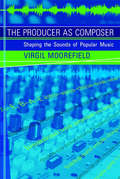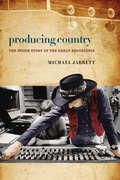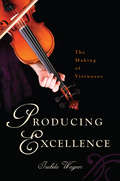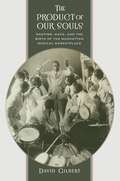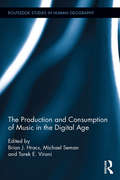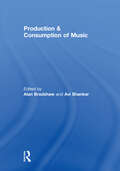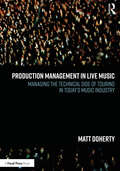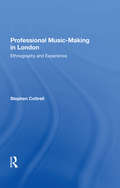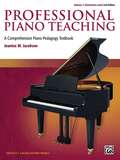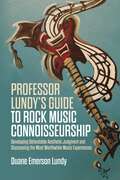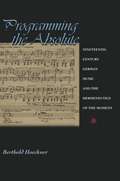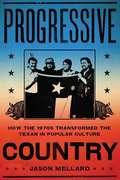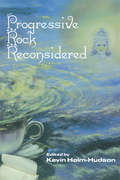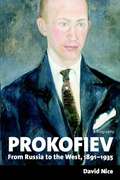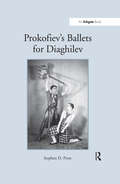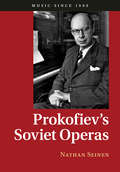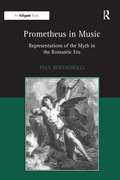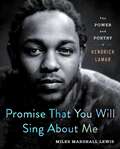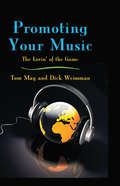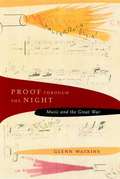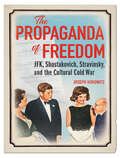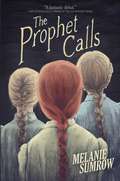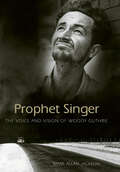- Table View
- List View
The Producer as Composer: Shaping the Sounds of Popular Music
by Virgil MoorefieldThe evolution of the record producer from organizer to auteur, from Phil Spector and George Martin to the rise of hip-hop and remixing. In the 1960s, rock and pop music recording questioned the convention that recordings should recreate the illusion of a concert hall setting. The Wall of Sound that Phil Spector built behind various artists and the intricate eclecticism of George Martin's recordings of the Beatles did not resemble live performances—in the Albert Hall or elsewhere—but instead created a new sonic world. The role of the record producer, writes Virgil Moorefield in The Producer as Composer, was evolving from that of organizer to auteur; band members became actors in what Frank Zappa called a "movie for your ears." In rock and pop, in the absence of a notated score, the recorded version of a song—created by the producer in collaboration with the musicians—became the definitive version. Moorefield, a musician and producer himself, traces this evolution with detailed discussions of works by producers and producer-musicians including Spector and Martin, Brian Eno, Bill Laswell, Trent Reznor, Quincy Jones, and the Chemical Brothers. Underlying the transformation, Moorefield writes, is technological development: new techniques—tape editing, overdubbing, compression—and, in the last ten years, inexpensive digital recording equipment that allows artists to become their own producers. What began when rock and pop producers reinvented themselves in the 1960s has continued; Moorefield describes the importance of disco, hip-hop, remixing, and other forms of electronic music production in shaping the sound of contemporary pop. He discusses the making of Pet Sounds and the production of tracks by Public Enemy with equal discernment, drawing on his own years of studio experience. Much has been written about rock and pop in the last 35 years, but hardly any of it deals with what is actually heard in a given pop song. The Producer as Composer tries to unravel the mystery of good pop: why does it sound the way it does?
Producing Country: The Inside Story of the Great Recordings (Music/Interview)
by Michael JarrettMusicians make music. Producers make records. In the early days of recorded music, the producer was the "artists-and-repertoire man," or A&R man, for short. A powerful figure, the A&R man chose both who would record and what they would record. His decisions profoundly shaped our musical tastes. Don Law found country bluesman Robert Johnson and honky-tonk crooner Lefty Frizzell. Cowboy Jack Clement took the initiative to record Jerry Lee Lewis (while his boss, Sam Phillips, was away on business). When Ray Charles said he wanted to record a country-and-western album, Sid Feller gathered songs for his consideration. The author's extensive interviews with music makers offer the fullest account ever of the producer's role in creating country music. In its focus on recordings and record production, Producing Country tells the story of country music from its early years to the present day through hit records by Hank Williams, George Jones, Patsy Cline, Buck Owens, Dolly Parton, Johnny Cash, Loretta Lynn, Waylon Jennings, and Merle Haggard, among many others.Includes original interviews with producers Chet Atkins, Pete Anderson, Jimmy Bowen, Bobby Braddock, Harold Bradley, Tony Brown, Blake Chancey, Jack Clement, Scott Hendricks, Bob Johnston, Jerry Kennedy, Blake Mevis, Ken Nelson, Jim Ed Norman, Allen Reynolds, Jim Rooney, James Stroud, Paul Worley, and Reggie Young, among others.
Producing Excellence
by Izabela WagnerDriven by a passion for music, for excellence, and for fame, violin soloists are immersed from early childhood in high-pressure competitions, regular public appearances, and arduous daily practice. An in-depth study of nearly one hundred such children, Producing Excellence illuminates the process these young violinists undergo to become elite international soloists. A musician and a parent of a young violinist, sociologist Izabela Wagner offers an inside look at how her young subjects set out on the long road to becoming a soloist. The remarkable research she conducted--at rehearsals, lessons, and in other educational settings--enabled her to gain deep insight into what distinguishes these talented prodigies and their training. She notes, for instance, the importance of a family culture steeped in the values of the musical world. Indeed, more than half of these students come from a family of professional musicians and were raised in an atmosphere marked by the importance of instrumental practice, the vitality of music as a vocation, and especially the veneration of famous artists. Wagner also highlights the highly structured, rigorous training system of identifying, nurturing, and rewarding talent, even as she underscores the social, economic, and cultural factors that make success in this system possible. Offering an intimate portrait of the students, their parents, and their instructors, Producing Excellence sheds new light on the development of exceptional musical talent, as well as draw much larger conclusions as to "producing prodigy" in other competition-prone areas, such as sports, sciences, the professions, and other arts. Wagner's insights make this book valuable for academics interested in the study of occupations, and her clear, lively writing is perfect for general readers curious about the ins and outs of training to be a violin soloist.
The Product of Our Souls
by David GilbertIn 1912 James Reese Europe made history by conducting his 125-member Clef Club Orchestra at Carnegie Hall. The first concert by an African American ensemble at the esteemed venue was more than just a concert--it was a political act of desegregation, a defiant challenge to the status quo in American music. In this book, David Gilbert explores how Europe and other African American performers, at the height of Jim Crow, transformed their racial difference into the mass-market commodity known as "black music." Gilbert shows how Europe and others used the rhythmic sounds of ragtime, blues, and jazz to construct new representations of black identity, challenging many of the nation's preconceived ideas about race, culture, and modernity and setting off a musical craze in the process.Gilbert sheds new light on the little-known era of African American music and culture between the heyday of minstrelsy and the Harlem Renaissance. He demonstrates how black performers played a pioneering role in establishing New York City as the center of American popular music, from Tin Pan Alley to Broadway, and shows how African Americans shaped American mass culture in their own image.
The Production and Consumption of Music in the Digital Age (Routledge Studies in Human Geography #58)
by Tarek E. Virani Brian J. Hracs Michael SemanThe economic geography of music is evolving as new digital technologies, organizational forms, market dynamics and consumer behavior continue to restructure the industry. This book is an international collection of case studies examining the spatial dynamics of today’s music industry. Drawing on research from a diverse range of cities such as Santiago, Toronto, Paris, New York, Amsterdam, London, and Berlin, this volume helps readers understand how the production and consumption of music is changing at multiple scales – from global firms to local entrepreneurs; and, in multiple settings – from established clusters to burgeoning scenes. The volume is divided into interrelated sections and offers an engaging and immersive look at today’s central players, processes, and spaces of music production and consumption. Academic students and researchers across the social sciences, including human geography, sociology, economics, and cultural studies, will find this volume helpful in answering questions about how and where music is financed, produced, marketed, distributed, curated and consumed in the digital age.
Production & Consumption of Music
by Alan Bradshaw Avi ShankarThis collection considers music within the spheres of production and consumption and pulls together an interdisciplinary collection of music studies from around the world, ranging from an ethnomusicological analysis of the condition of Tibetan music and its role within the Chinese state, the changing reception of anti-apartheid music by white musicians in South Africa according to new configurations of society and its memory of recent history, a lyrical exploration of jazz as a signifier of crime and other nefarious activities within film history, an analysis of how music charts and maps the social network and gender roles in Jamaica and a landmark commentary on how music is framed by David Hemsondalgh. As opposed to other studies which explore music just in terms of its reception or its composition and distribution, this collection should make necessary reading for anybody interested in the wider nexus of music’s existence and how it waxes and wanes with ideology, politics, gender, business and much more besides.
Production Management in Live Music: Managing the Technical Side of Touring in Today’s Music Industry
by Matt DohertyProduction Management in Live Music: Managing the Technical Side of Touring in Today’s Music Industry is a handbook for the aspiring production manager looking to forge a career in the live music industry. This book outlines the role that a production manager performs and their key responsibilities, and takes the reader step by step through the entire process of preparing a show for a tour. From dealing with artists and management to hiring crew, from booking vendors and scheduling the day-to-day of a busy tour, this text covers everything that is needed to take the show into rehearsals and finally on the road. Every aspect of the job is covered, including the very important challenges that face today’s industry in the realms of sustainability, inclusion, diversity and mental health. Whether the show be on a festival, in a small theatre or club, or in a modern arena, this book clearly lays out the tasks and challenges and offers practical solutions to ensure the smooth running of a live performance. Production Management in Live Music is written for students in stage and production management courses and emerging professionals working in live music touring.
Professional Knowledge in Music Teacher Education
by Pamela BurnardThe complexity of the various forms of knowledge and practices that are encountered by teachers, university lecturers, teacher trainers, student teachers, policy makers and researchers, demands careful thought and reflection. Professional Knowledge in Music Teacher Education focuses on how knowledge is understood, what theories are held and the related assumptions that are made about teachers and learners, as well as how theory and practice can be understood, with useful and imaginative connections made between the two in music teacher education. Internationally renowned contributors address a number of fundamental questions designed to take the reader to the heart of current debates around knowledge, practice, professionalism, and learning and teaching in music as well as considering how all these elements are influenced by economic, cultural and social forces. The book demonstrates how research can inform pedagogical approaches in music teacher education; methods, courses and field experiences, and prepare teachers for diverse learners from a range of educational settings. The book will appeal to those interested in the development of appropriate professional knowledge and pedagogic practices in music teacher education.
Professional Music-making in London: Ethnography and Experience (Soas Musicology Ser.)
by Stephen CottrellProfessional Music-Making in London is an engaging yet innovative study which examines the lives and work of Western art musicians from an ethnographic perspective. Drawing in part on his own professional experience, Stephen Cottrell considers to what extent musicians in Western society conform to Alan Merriam's paradigmatic assessment of them as having low status yet high respect, as well as being given an unusual degree of licence to deviate from convention. The book draws on a wide variety of approaches from scholars elsewhere: from ethnomusicologists such as Bruno Nettl and Henry Kingsbury, performance theorists such as Richard Schechner and Victor Turner, as well as psychologists such as Sigmund Freud and Melanie Klein. This rich intellectual heritage provides the framework for discussion of a variety of themes, including how musicians conceive their self identity and how this is negotiated in the professional musical world; how the deputy system facilitates musical exchange and engenders gift relationships; how humour lubricates social and musical relationships and mitigates the stresses of musicians' lives; and how the events in which musicians participate can be viewed as quasi-rituals, and thus related to analogous events in non-Western cultures. The focus of this study is on professional music-making in London, one of the world's busiest centres of musical performance - yet the issues raised and explored are deeply relevant to other major centres of Western art music, such as New York, Berlin or Sydney. Ethnomusicologists, anthropologists, musicologists, performers, teachers and concert-goers will find this book a stimulating insight into, and investigation of, Western art musicians and their place in today's world.
Professional Piano Teaching: A Comprehensive Piano Pedagogy Textbook (Professional Piano Teaching #Vol 1)
by Jeanine M. JacobsonProfessional Piano Teaching offers a practical guide to the art of piano teaching. Volume 1, now available as an updated second edition, is an excellent introduction to the profession of teaching piano. This revised second edition has been expanded to include chapters on teaching adult students and teaching popular, sacred, and other familiar music. Designed to serve as a basic text for a first-semester or lower-division piano pedagogy course, it provides an overview of learning principles and a thorough approach to essential aspects of teaching elementary-level students. Special features include discussions on how to teach, not just what to teach; numerous musical examples; chapter summaries; and suggested projects for new and experienced teachers.
Professor Lundy's Guide to Rock Music Connoisseurship: Developing Defendable Aesthetic Judgment and Discovering the Most Worthwhile Music Experiences
by Duane E. LundyThis empirical and theoretical book should be of interest to anyone who dares to consider the contentious topic of measuring and justifying aesthetic value in music, as well as the issue of how experts compare to nonexperts in terms of aesthetic fluency,
Program Music
by Jonathan KregorProgram music was one of the most flexible and contentious novelties of the long nineteenth century, covering a diverse range that included the overtures of Beethoven and Mendelssohn, the literary music of Berlioz and Schumann, Liszt's symphonic poems, the tone poems of Strauss and Sibelius, and compositions by groups of composers in Russia, Bohemia, the United States, and France. In this accessible Introduction, Jonathan Kregor explores program music's ideas and repertoire, discussing both well-known and less familiar pieces by an array of nineteenth- and twentieth-century composers. Setting program music in the context of the intellectual debates of the period, Kregor presents the criticism of writers like A. B. Marx and Hanslick to reveal program music's growth, dissemination, and reception. This comprehensive overview features numerous illustrations and music examples and provides detailed case studies of battle music, Shakespeare settings, and Goethe's Faust.
Programming the Absolute: Nineteenth-Century German Music and the Hermeneutics of the Moment
by Berthold HoecknerProgramming the Absolute discusses the notorious opposition between absolute and program music as a true dialectic that lies at the heart of nineteenth-century German music. Beginning with Beethoven, Berthold Hoeckner traces the aesthetic problem of musical meaning in works by Schumann, Wagner, Liszt, Mahler, and Schoenberg, whose private messages and public predicaments are emblematic for the cultural legacy of this rich repertory. After Romanticism had elevated music as a language "beyond" language, the ineffable spurred an unprecedented proliferation of musical analysis and criticism. Taking his cue from Adorno, Hoeckner develops the idea of a "hermeneutics of a moment," which holds that musical meaning crystallizes only momentarily--in a particular passage, a progression, even a single note. And such moments can signify as little as a fleeting personal memory or as much as the whole of German music. Although absolute music emerged with a matrix of values--the integrity of the subject, the aesthetic autonomy of art, and the intrinsic worth of high culture--that are highly contested in musicology today, Hoeckner argues that we should not completely discard the ideal of a music that continues to offer moments of transcendence and liberation. Passionately and artfully written, Hoeckner's quest for an "essayistic musicology" displays an original intelligence willing to take interpretive risks. It is a provocative contribution to our knowledge about some of Europe's most important music--and to contemporary controversies over how music should be understood and experienced.
Progressive Country: How the 1970s Transformed the Texan in Popular Culture
by Jason MellardDuring the early 1970s, the nation’s turbulence was keenly reflected in Austin’s kaleidoscopic cultural movements, particularly in the city’s progressive country music scene. Capturing a pivotal chapter in American social history, Progressive Country maps the conflicted iconography of “the Texan” during the ’70s and its impact on the cultural politics of subsequent decades. This richly textured tour spans the notion of the “cosmic cowboy,” the intellectual history of University of Texas folklore and historiography programs, and the complicated political history of late-twentieth-century Texas. Jason Mellard analyzes the complex relationship between Anglo-Texan masculinity and regional and national identities, drawing on cultural studies, American studies, and political science to trace the implications and representations of the multi-faceted personas that shaped the face of powerful social justice movements. From the death of Lyndon Johnson to Willie Nelson’s picnics, from the United Farm Workers’ marches on Austin to the spectacle of Texas Chic on the streets of New York City, Texas mattered in these years not simply as a place, but as a repository of longstanding American myths and symbols at a historic moment in which that mythology was being deeply contested. Delivering a fresh take on the meaning and power of “the Texan” and its repercussions for American history, this detail-rich exploration reframes the implications of a populist moment that continues to inspire progressive change.
Progressive Rock Reconsidered
by Kevin Holm-HudsonIn this book, the glory days of progressive rock are relived in a series of insightful essays about the key bands, songwriters and songs that made prog-rock such an innovative style.
Prokofiev--A Biography: From Russia to the West, 1891-1935
by David NiceSince 1991--the year that marked both the fall of the Soviet Union and the centenary of Sergey Prokofiev's birth--a new assessment of the life and work of this remarkable and often elusive composer has become both possible and necessary. For this definitive study David Nice has drawn on an unprecedented range of new archival material, manuscripts of works previously unexamined and interviews. This book follows Prokofiev's personal and musical journey from his childhood on a Ukrainian country estate to the years he spent travelling in America and Europe as an acclaimed interpreter of his own works. Nice sheds new light on the striking compositions of Prokofiev's early years, his training at the St. Petersburg Conservatory and the circumstances of his departure from Russia in 1918 for what the composer thought would be a short tour of America. Through letters and documents, a thorough picture is also presented of his marriage and family relationships. Nice re-evaluates the music of Prokofiev's years in the west and traces his unique approach to new melodic thinking from the early works through the more complicated music of the early 1930s and on to the fresh simplicity of his early Soviet scores. He also examines the complex reasons that led Prokofiev to move his family to the Soviet Union in 1936. For coverage of the Soviet years until his death in 1953, see the book "The People's Artist" by Simon Morrison. David Nice is a writer, broadcaster and lecturer on music. He has taught at Goldsmiths College and lectures at Birkbeck College, the University of London, at Morley College and the City Literary Institute. A regular contributor to BBC Radio 3, he produces his own opera channel for Music Choice Europe. He writes for the Guardian and other British newspapers, and reviews on a monthly basis for the BBC Music Magazine. His previous books include short studies of Elgar, Richard Strauss, Tchaikovsky and the history of opera, and he contributed the chapter on Russian conductors for The Cambridge Companion to Conducting.
Prokofiev's Ballets for Diaghilev
by StephenD. PressBallet impresario Sergey Pavlovich Diaghilev and composer Sergey Sergeyevich Prokofiev are eminent figures in twentieth-century cultural history, yet this is the first detailed account of their fifteen-year collaboration. The beginning was not trouble-free, but despite two false starts (Ala i Lolli and the first version of its successor, Chout) Diaghilev maintained his confidence in the composer. With his guidance and encouragement Prokofiev established his mature balletic style. After some years of estrangement during which Prokofiev wrote for choreographer Boris Romanov and conductor/publisher Serge Koussevitsky, Diaghilev came to the composer's rescue at a low point in his Western career. The impresario encouraged Prokofiev's turn towards 'a new simplicity' and offered him a great opportunity for career renewal with a topical ballet on Soviet life (Le Pas d'acier). Even as late as 1928-29 Diaghilev compelled Prokofiev to achieve new heights of expressivity in his characterizations (L'Enfant prodigue). Although Western scholars have investigated Prokofiev's operas, piano works, and symphonies, little attention has been paid to his early ballets written for Diaghilev's Ballets Russes. Despite Prokofiev's devotion to opera, it was his ballets for Diaghilev as much as his concertos and solo piano works that earned his renown in Western Europe in the 1920s. Stephen D. Press discusses the genesis of each ballet, including the important contributions of the scenic designers (Mikhail Larionov, Georgy Yakulov and Georges Rouault) and the choreographer/dancers (L id Massine, Serge Lifar and George Balanchine), and the special relationship between the ballets' progenitors.
Prokofiev's Soviet Operas (Music since 1900)
by Nathan SeinenProkofiev considered himself to be primarily a composer of opera, and his return to Russia in the mid-1930s was partially motivated by the goal to renew his activity in this genre. His Soviet career coincided with the height of the Stalin era, when official interest and involvement in opera increased, leading to demands for nationalism and heroism to be represented on the stage to promote the Soviet Union and the Stalinist regime. Drawing on a wealth of primary source materials and engaging with recent scholarship in Slavonic studies, this book investigates encounters between Prokofiev's late operas and the aesthetics of socialist realism, contemporary culture (including literature, film, and theatre), political ideology, and the obstacles of bureaucratic interventions and historical events. This contextual approach is interwoven with critical interpretations of the operas in their original versions, providing a new account of their stylistic and formal features and connections to operatic traditions.
Prometheus in Music: Representations of the Myth in the Romantic Era
by Paul BertagnolliThe ancient Greek myth of Prometheus, the primordial Titan who defied the Olympian gods by stealing fire from the heavens as a gift for humanity, enjoyed unprecedented popularity during the Romantic era. An international coterie of writers such as Goethe, Monti, Byron, the Shelleys, Sainte-H ne, Coleridge, Browning, and Bridges engaged with the legend, while composers such as Beethoven, Reichardt, Schubert, Wolf, Liszt, Hal Saint-Sa Holm Faur Parry, Goldmark, and Bargiel based works of diverse genres on the fable. Romantic authors and composers developed a unique perspective on the myth, emphasizing its themes of rebellion, punishment for transgression and creative autonomy, in great contrast to artists of the preceding era, who more characteristically ignored the tribulations of Prometheus and depicted him as the animator of a na Arcadian mankind who, when awakened from their spiritual dormancy, expressed astonishment at the wonders of nature and paid homage to the Titan as a new god. Paul Bertagnolli charts the progress of the myth during the nineteenth century, as it articulates an extraordinary variety of issues pertaining to culture, society, aesthetics, and philosophy. Drawing on archival research, dance history, sketch studies, literary theory, linear analysis, topos theory, and reception history, individual chapters demonstrate that the legend served as a vehicle to express opinions on subjects as diverse as aristocratic patronage, movements of the body on the public stage, rebellion against political and religious authority, outright atheism, humanitarianism of the German Enlightenment, interest in the music of Greek antiquity, industrialization, nationalism inflamed by war, populism, and the aesthetics of musical form. Composers often resorted to varied and unorthodox musical techniques in order to reflect such remarkable subjects: Beethoven outraged critics by implying a key other than the tonic at the outset of the overture to
Promise That You Will Sing About Me: The Power and Poetry of Kendrick Lamar
by Miles Marshall LewisA stunning, in-depth look at the power and poetry of one of the most consequential rappers of our time.Kendrick Lamar is one of the most influential rappers, songwriters and record producers of his generation. Widely known for his incredible lyrics and powerful music, he is regarded as one of the greatest rappers of all time. In Promise That You Will Sing About Me, pop culture critic and music journalist Miles Marshall Lewis explores Kendrick Lamar’s life, his roots, his music, his lyrics, and how he has shaped the musical landscape. With incredible graphic design, quotes, lyrics and commentary from Ta-Nehisi Coates, Alicia Garza and more, this book provides an in-depth look at how Kendrick came to be the powerhouse he is today and how he has revolutionized the industry from the inside.
Promoting Your Music: The Lovin' of the Game
by Dick Weissman Tom MayWhile many dream of a career as a singer/songwriter, few know how to go about getting bookings, copywrighting and protecting their songs, making promotional recordings, getting radio and print coverage and negotiating contracts for appearances. This book covers all of these topics and more, aimed at everyone from the absolute beginner to the more seasoned performer, to help them avoid the common pitfalls and problems encountered along the road to success. The authors draw on years of experience as songwriters and performers. They have conducted interviews with many singer/songwriters who share their experiences, both good and bad, as they’ve worked their way up from local gigs to full-time careers. Throughout, practical tips are highlighted and real-life stories help illuminate common issues faced by all performers/songwriters.
Proof through the Night: Music and the Great War
by Glenn WatkinsWatkins investigates the variable roles of music primarily from the angle of the Entente nations' perceived threat of German hegemony in matters of intellectual and artistic accomplishment--a principal concern not only for Europe but also for the United States, whose late entrance into the fray prompted a renewed interest in defining America as an emergent world power as well as a fledgling musical culture.
The Propaganda of Freedom: JFK, Shostakovich, Stravinsky, and the Cultural Cold War (Music in American Life)
by Joseph HorowitzThe perils of equating notions of freedom with artistic vitality Eloquently extolled by President John F. Kennedy, the idea that only artists in free societies can produce great art became a bedrock assumption of the Cold War. That this conviction defied centuries of historical evidence--to say nothing of achievements within the Soviet Union--failed to impact impregnable cultural Cold War doctrine. Joseph Horowitz writes: “That so many fine minds could have cheapened freedom by over-praising it, turning it into a reductionist propaganda mantra, is one measure of the intellectual cost of the Cold War.” He shows how the efforts of the CIA-funded Congress for Cultural Freedom were distorted by an anti-totalitarian “psychology of exile” traceable to its secretary general, the displaced Russian aristocrat/composer Nicolas Nabokov, and to Nabokov’s hero Igor Stravinsky. In counterpoint, Horowitz investigates personal, social, and political factors that actually shape the creative act. He here focuses on Stravinsky, who in Los Angeles experienced a “freedom not to matter,” and Dmitri Shostakovich, who was both victim and beneficiary of Soviet cultural policies. He also takes a fresh look at cultural exchange and explores paradoxical similarities and differences framing the popularization of classical music in the Soviet Union and the United States. In closing, he assesses the Kennedy administration’s arts advocacy initiatives and their pertinence to today’s fraught American national identity. Challenging long-entrenched myths, The Propaganda of Freedom newly explores the tangled relationship between the ideology of freedom and ideals of cultural achievement.
The Prophet Calls
by Melanie SumrowGentry Forrester feels lucky to live among God’s chosen people in the Prophet's compound, but when music is outlawed, Gentry and her older brother, Tanner, sneak out of the community. When they return, all bets are off as the Prophet exercises his control.Born into a polygamous community in the foothills of New Mexico, Gentry Forrester feels lucky to live among God’s chosen. Here, she lives apart from the outside world and its “evils.” On her thirteenth birthday, Gentry receives a new violin from her father and, more than anything, she wants to play at the Santa Fe Music Festival with her brother, Tanner. But then the Prophet calls from prison and announces he has outlawed music in their community and now forbids women to leave. Determined to play, Gentry and Tanner sneak out. But once they return, the Prophet exercises control from prison, and it has devastating consequences for Gentry and her family. Soon, everything Gentry has known is turned upside down. She begins to question the Prophet’s teachings and his revelations, especially when his latest orders put Gentry’s family in danger. Can Gentry find a way to protect herself and her family from the Prophet and escape the only life she’s ever known? This realistic, powerful story of family, bravery, and following your dreams is a can't-miss debut novel from Melanie Sumrow.
Prophet Singer: The Voice and Vision of Woody Guthrie (American Made Music Series)
by Mark Allan JacksonProphet Singer: The Voice and Vision of Woody Guthrie examines the cultural and political significance of lyrics by beloved songwriter and activist Woodrow Wilson “Woody” Guthrie. The text traces how Guthrie documented the history of America's poor and disadvantaged through lyrics about topics as diverse as the Dust Bowl and the poll tax. Divided into chapters covering specific historical topics such as race relations and lynchings, famous outlaws, the Great Depression, and unions, the book takes an in-depth look at how Guthrie manipulated his lyrics to explore pressing issues and to bring greater political and economic awareness to the common people. Incorporating the best of both historical and literary perspectives, Mark Allan Jackson references primary sources including interviews, recordings, drawings, and writings. He includes a variety of materials from the Smithsonian Institution, the Library of Congress, and the Woody Guthrie Archives. Many of these have never before been widely available. The result provides new insights into one of America's most intriguing icons. Prophet Singer offers an analysis of the creative impulse behind and ideals expressed in Guthrie's song lyrics. Details from the artist's personal life as well as his interactions with political and artistic movements from the first half of the twentieth century afford readers the opportunity to understand how Guthrie's deepest beliefs influenced and found voice in the lyrics that are now known and loved by millions.
